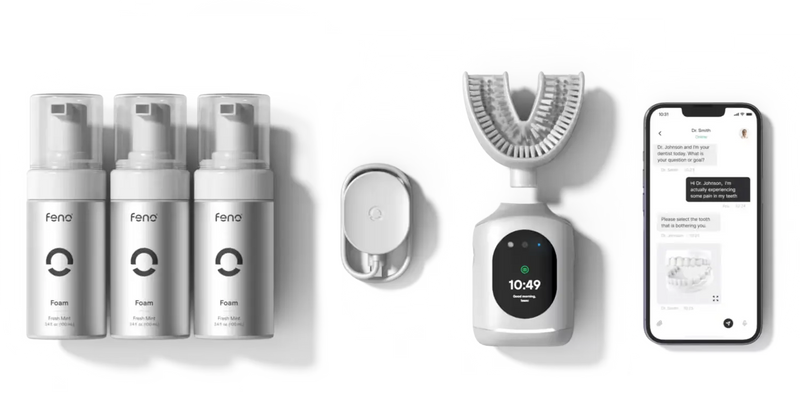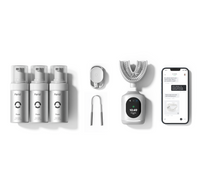
The Golden Window for Oral Health: How to Time Your Dental Care for Maximum Benefits
Essential Takeaways
- Your mouth's natural repair cycle peaks during three critical periods: mid-morning, midday, and between meals. Dr. Huberman's research reveals that allowing 2-6 hour breaks between acidic foods, limiting drinks to 30-minute windows, and utilizing morning's mineral-rich saliva production can significantly enhance tooth remineralization. By strategically timing your meals and rinses, you can maximize your body's natural dental repair processes for optimal oral health.
Did you know your body has specific times when it's naturally primed for dental repair? Stanford neuroscientist Dr. Andrew Huberman has revealed groundbreaking research about optimal timing for oral health maintenance. This guide explores these crucial windows of opportunity and how to leverage them for better dental health.
What is the Oral Health Golden Window?
"We have an amazing opportunity during the day, especially in the morning and throughout the day, to create a lot of saliva that's the right pH to support remineralization of the teeth," explains Dr. Huberman. This natural process is so significant that Huberman has designated oral health as "the seventh pillar to the so-called six pillars of mental health, physical health and performance".

Key Times for Natural Dental Repair
1. Mid-Morning Peak
Your body's first optimal window occurs during mid-morning, characterized by:
- Maximum natural saliva production
- Highest concentration of protective minerals
- Superior buffering capacity against acids
2. Midday Optimization
During the middle of the day, your mouth creates ideal conditions through:
- Perfect pH balance for tooth protection
- Enhanced mineral absorption
- Optimal environment for natural repair processes
3. Between-Meal Recovery
The periods between meals offer crucial opportunities for dental health:
- Extended protection from acid exposure
- Continuous protective saliva coating
- Minimal harmful bacterial activity
Understanding the Sugar-Acid Connection
Dr. Huberman emphasizes a critical insight about carbohydrates: "Any carbohydrate provides a sugar that Streptococcus mutans can eat and create acid and demineralize your teeth". This understanding is fundamental to timing your meals and snacks effectively.
Optimizing Your Daily Dental Schedule
Huberman suggests a strategic approach to consuming beverages and foods:
- Consume drinks within a 5-30 minute window
- Rinse with water afterward to clear acidity
- Allow for 2-6 hour periods without acidic intake
The Power of Extended Breaks
As Dr. Huberman notes, "Having a stretch of time of maybe two, four, six hours or more where you're not eating anything or ingesting anything acidic... can be very beneficial". These breaks are essential because they:
- Allow pH levels to stabilize naturally
- Maximize saliva's protective capabilities
- Support your body's remineralization process
- Reduce harmful acid exposure

Practical Implementation Strategies
Daily Routine Optimization
- Schedule main meals during optimal pH windows
- Create intentional gaps between eating sessions
- Time acidic beverage consumption strategically
- Use water rinses as part of your routine
- Align dental care with your body's natural repair cycle
Frequently Asked Questions About the Oral Health Golden Window
Q: How long should I wait after eating to brush my teeth?
A: According to Dr. Huberman's research, it's best to wait at least 30 minutes after eating before brushing your teeth. This allows your saliva to naturally neutralize acids and begin the remineralization process.
Q: Does drinking water affect the Golden Window?
A: No, plain water doesn't interfere with the natural repair process. In fact, drinking water can help maintain optimal pH levels and clear food particles from your mouth.
Q: How many hours should I aim to have between meals for optimal dental health?
A: Dr. Huberman recommends aiming for 2-6 hour periods without acidic food or drink intake to maximize your body's natural repair mechanisms.
Q: Does coffee or tea consumption affect the Golden Window?
A: Yes, acidic beverages like coffee and tea can interrupt the natural remineralization process. It's best to consume these drinks within a designated 30-minute window and rinse with water afterward.
Q: Can I chew sugar-free gum during the Golden Window?
A: Sugar-free gum can actually help stimulate saliva production, which supports the natural repair process. However, it's best to choose xylitol-based gums, as they have been shown to have additional dental benefits.
Understanding and working with your body's natural dental repair schedule can significantly improve your oral health outcomes. By following Dr. Huberman's insights and implementing these timing strategies, you can maximize your dental health while minimizing potential damage.
*This blog is not an endorsement or affiliation with the Huberman Lab podcast. The content is for informational purposes only.
References:
- Huberman Lab Podcast: How to Improve Oral Health & Its Critical Role in Brain & Body Health
- PubMed - Saliva: its secretion, composition and functions
- Acta Biomaterialia - Acid-induced demineralisation of human enamel as a function of time and pH observed using X-ray and polarised light imaging
- PubMed - Etiology of dental erosion--extrinsic factors
- NIH - The rôle of saliva in maintaining oral health and as an aid to diagnosis
- PubMed - Comparative Study of Salivary pH, Buffer Capacity, and Flow in Patients with and without Gastroesophageal Reflux Disease
- PubMed - Dental plaque as a biofilm and a microbial community – implications for health and disease
- PubMed - The continuum of dental caries--evidence for a dynamic disease process

Feno Founders Edition Bundle
Advanced Oral Health in 20 Seconds with the Feno Smartbrush™
Get Yours Now!





